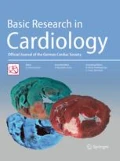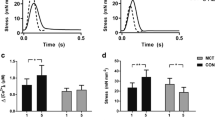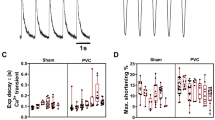Abstract
The reduced power of the failing heart can be ascribed to a combination of reduced force and slower contraction. We hypothesized that these two properties are due to different cellular mechanisms. We measured contraction parameters both in vivo and in isolated left ventricular (LV) cardiomyocytes from a rat model of post infarction congestive heart failure (CHF). ECG was measured simultaneously with echocardiography and LV pressure, respectively. Shortening and shortening velocity (SV) in isolated cardiomyocytes were measured during different stimulation protocols. LV end diastolic pressure (LVEDP) was 24.6 ± 0.7 mmHg in CHF. LV systolic pressure was decreased by 20%, maximum rate of pressure development in the LV (+dP/dt max) by 36% and time in systole increased by 20% in CHF compared to sham. Electrical remodelling occurred in CHF cells, which were depolarized and had prolonged action potentials (AP) compared to sham cells. Fractional shortening (FS) was increased in CHF compared to sham independent of stimulation protocol. Larger FS was accompanied by increased sarcoplasmic reticulum (SR) Ca2+ load and depended on the electrical remodelling. Time to peak contraction (TTP) was increased in CHF compared to sham cells, but in contrast to FS, TTP was only slightly affected when the cells were stimulated with sham APs and sham diastolic membrane potential (DMP). Contraction duration (corresponding to systolic duration) was 25% longer in CHF than in sham independent on stimulation protocol. We conclude that electrical remodelling affecting DMP and AP duration (APD) significantly affects the size of contraction, whereas the mechanism for slowing of contraction in CHF is different.








Similar content being viewed by others
References
Akar FG, Wu RC, Juang GJ, Tian Y, Burysek M, DiSilvestre D, Xiong W, Armoundas AA, Tomaselli GF (2005) Molecular mechanisms underlying K+ current downregulation in canine tachycardia-induced heart failure. AJP Heart Circ Physiol 288:H2887–H2896
An WF, Bowlby MR, Betty M, Cao J, Ling H-P, Mendoza G, Hinson JW, Mattsson KI, Strassle BW, Trimmer JS, Rhodes KJ (2000) Modulation of A-type potassium channels by a family of calcium sensors. Nature 403:553–556
Anand IS, Liu D, Chugh SS, Prahash AJC, Gupta S, John R, Popescu F, Chandrashekhar Y (1997) Isolated myocyte contractile function is normal in postinfarct remodeled rat heart with systolic dysfunction. Circulation 96:3974–3984
Armoundas AA, Hobai IA, Tomaselli GF, Winslow RL, O’Rourke B (2003) Role of sodium–calcium exchanger in modulating the action potential of ventricular myocytes from normal and failing hearts. Circ Res 93:46–53
Armoundas AA, Rose J, Aggarwal R, Stuyvers BD, O’Rourke B, Kass DA, Marbán E, Shorofsky SR, Tomaselli GF, Balke CW (2007) Cellular and molecular determinants of altered Ca2+ handling in the failing rabbit heart: primary defects in SR Ca2+ uptake and release mechanisms. AJP Heart Circ Physiol 292:H1607–H1618
Armoundas AA, Wu R, Juang G, Marbán E, Tomaselli GF (2001) Electrical and structural remodeling of the failing ventricle. Pharmacol Therapeutics 92:213–230
Baker C, Love CJ, Moeschberger ML, Orsinelli DA, Yamokoski L, Leier CV (2004) Time intervals of cardiac resynchronization therapy in heart failure. Am J Cardiol 94:1192–1196
Bassani JWM, Yuan W, Bers DM (1995) Fractional SR Ca release is regulated by trigger Ca and SR Ca content in cardiac myocytes. AJP Cell Physiol 268:C1313–C1329
Belin RJ, Sumandea MP, Kobayashi T, Walker LA, Rundell VL, Urboniene D, Yuzhakova M, Ruch SH, Geenen DL, Solaro RJ, de Tombe PP (2006) Left ventricular myofilament dysfunction in rat experimental hypertrophy and congestive heart failure. AJP Heart Circulat Physiol 291:H2344–H2353
Bers DM (2001) Excitation–contraction coupling and cardiac contractile force. Kluwer, Dordrecht
Blanc-Guillemaud V, Beck L, Cherif OK, Champeroux P, Richard S, Davy J-M (2005) Cellular electrophysiological changes in rats with heart failure and ventricular arrhythmias—in vitro–in vivo correlations. J Clin Basic Cardiol 8:23–28
Bøkenes J, Sjaastad I, Sejersted OM (2005) Artifactual contractions triggered by field stimulation of cardiomyocytes. J Appl Physiol 98:1712–1719
Bøkenes J, Sjaastad I, Sejersted OM (2002) Contraction characteristics of failing rat cardiomyocytes. Biophys J 82:601a
Bouchard RA, Clark RB, Giles WR (1993) Regulation of unloaded cell shortening by sarcolemmal sodium–calcium exchange in isolated rat ventricular myocytes. J Physiol (Lond) 469:583–599
Bouchard R, Clark RB, Juhasz AE, Giles WR (2004) Changes in extracellular K+ concentration modulate contractility of rat and rabbit cardiac myocytes via the inward rectifier K+ current I K1. J Physiol (Lond) 556:773–790
Capasso JM, Li P, Anversa P (1993) Cytosolic calcium transients in myocytes isolated from rats with ischemic heart failure. AJP Heart Circ Physiol 265:H1953–H1964
Chen W, Gibson D (1979) Mechanisms of prolongation of pre-ejection period in patients with left ventricular disease. Br Heart J 42:304–310
Chen X, Piacentino V III, Furukawa S, Goldman B, Margulies KB, Houser SR (2002) L-type Ca2+ channel density and regulation are altered in failing human ventricular myocytes and recover after support with mechanical assist devices. Circ Res 91:517–524
Chu G, Carr AN, Young KB, Lester JW, Yatani A, Sanbe A, Colbert MC, Schwartz SM, Frank KF, Lampe PD, Robbins J, Molkentin JD, Kranias EG (2002) Enhanced myocyte contractility and Ca2+ handling in a calcineurin transgenic model of heart failure. Cardiovasc Res 54:105–116
Cordeiro JM, Greene L, Heilmann C, Antzelevitch D, Antzelevitch C (2004) Transmural heterogeneity of calcium activity and mechanical function in the canine left ventricle. AJP Heart Circ Physiol 286:H1471–H1479
Dêschenes I, DiSilvestre D, Juang GJ, Wu RC, An WF, Tomaselli GF (2002) Regulation of Kv4.3 current by KChIP2 splice variants: a component of native cardiac I to? Circulation 106:423–429
Despa S, Islam MA, Weber CR, Pogwizd SM, Bers DM (2002) Intracellular Na+ concentration is elevated in heart failure but Na/K pump function is unchanged. Circulation 105:2543–2548
Eisner DA, Diaz ME, Li Y, O’Neill SC, Trafford AW (2005) Stability and instability of regulation of intracellular calcium. Exp Physiol 90:3–12
El-Chami MF, Pernetz MA, Howell S, Arita T, Martin RP, Lerakis S (2006) The use of echocardiography for the evaluation of dyssynchrony. Am J Med Sci 331:315–319
Fukumoto GH, Lamp ST, Motter C, Bridge JHB, Garfinkel A, Goldhaber JI (2005) Metabolic inhibition alters subcellular calcium release patterns in rat ventricular myocytes: implications for defective excitation–contraction coupling during cardiac ischemia and failure. Circ Res 96:551–557
Gaughan JP, Furukawa S, Jeevanandam V, Hefner CA, Kubo H, Margulies KB, McGowan BS, Mattiello JA, Dipla K, Piacentino V III, Li S, Houser SR (1999) Sodium/calcium exchange contributes to contraction and relaxation in failed human ventricular myocytes. AJP Heart Circulat Physiol 277:H714–H724
Gelband H, Bassett AL (1973) Depressed transmembrane potentials during experimentally induced ventricular failure in cats. Circ Res 32:625–635
Gómez AM, Valdivia HH, Cheng H, Lederer MR, Santana LF, Cannell MB, McCune SA, Altschuld RA, Lederer WJ (1997) Defective excitation–contraction coupling in experimental cardiac hypertrophy and heart failure. Science 276:800–806
Gómez AM, Guatimosim S, Dilly KW, Vassort G, Lederer WJ (2001) Heart failure after myocardial infarction. Altered excitation–contraction coupling. Circulation 104:688–693
Gupta S, Prahash AJC, Anand IS (2000) Myocyte contractile function is intact in the post-infarct remodeled rat heart despite molecular alterations. Cardiovasc Res 48:77–88
Herron TJ, McDonald KS (2002) Small amounts of a-myosin heavy chain isoform expression significantly increase power output of rat cardiac myocyte fragments. Circ Res 90:1150–1152
Hilal-Dandan R, Kanter JR, Brunton LL (2000) Characterization of G-protein signaling in ventricular myocytes from the adult mouse heart: differences from the rat. J Mol Cell Cardiol 32:1211–1221
Hobai IA, O’Rourke B (2001) Decreased sarcoplasmic reticulum calcium content is responsible for defective excitation–contraction coupling in canine heart failure. Circulation 103:1577–1584
Holt E, Tønnessen T, Lunde PK, Semb SO, Wasserstrom JA, Sejersted OM, Christensen G (1998) Mechanisms of cardiomyocyte dysfunction in heart failure following myocardial infarction in rats. J Mol Cell Cardiol 30:1581–1593
Huang B, El-Sherif T, Gidh-Jain MV, Qin D, El-Sherif N (2001) Alterations of sodium channel kinetics and gene expression in the postinfarction remodeled myocardium. J Cardiovasc Electrophysiol 12:218–225
Josephson IR, Sanchez-Chapula J, Brown AM (1984) Early outward current in rat single ventricular cells. Circ Res 54:157–162
Kaprielian R, Wickenden AD, Kassiri Z, Parker TG, Liu PP, Backx PH (1999) Relationship between K+ channel down-regulation and [Ca2+]i in rat ventricular myocytes following myocardial infarction. J Physiol (Lond) 517:229–245
Kuo H-C, Cheng C-F, Clark RB, Lin JJC, Lin JLC, Hoshijima M, Nguyên-Trân VTB, Gu Y, Ikeda Y, Chu P-H (2001) A defect in the Kv channel-interacting protein 2 (KChIP2) gene leads to a complete loss of I to and confers susceptibility to ventricular tachycardia. Cell 107:801–813
Lines GT, Sande JB, Louch WE, Mørk HK, Grøttum P, Sejersted OM (2006) Contribution of the Na+/Ca2+ exchanger to rapid Ca2+ release in cardiomyocytes. Biophys J 91:779–792
Liu X-S, Jiang M, Zhang M, Tang D, Clemo HF, Higgins RSD, Tseng G-N (2007) Electrical remodeling in a canine model of ischemic cardiomyopathy. AJP Heart Circ Physiol 292:H560–H571
Loennechen JP, Wisløff U, Falck G, Ellingsen ø (2002) Cardiomyocyte contractility and calcium handling partially recover after early deterioration during post-infarction failure in rat. Acta Physiol Scand 176:17–26
Louch WE, Bito V, Heinzel FR, Macianskiene R, Vanhaecke J, Flameng W, Mubagwa K, Sipido KR (2004) Reduced synchrony of Ca2+ release with loss of T-tubules—a comparison to Ca2+ release in human failing cardiomyocytes. Cardiovasc Res 62:63–73
Louch WE, Mørk HK, Sexton J, Strømme TA, Laake P, Sjaastad I, Sejersted OM (2006) T-tubule disorganization and reduced synchrony of Ca2+ release in murine cardiomyocytes following myocardial infarction. J Physiol (Lond) 574:519–533
Maack C, O’Rourke B (2007) Excitation–contraction coupling and mitochondrial energetics. Basic Res Cardiol 102:369–392
Maier LS, Braunhälter J, Horn W, Weichert S, Pieske B (2002) The role of SR Ca2+-content in blunted inotropic responsiveness of failing human myocardium. J Mol Cell Cardiol 34:455–467
Maltsev VA, Silverman N, Sabbah HN, Undrovinas AI (2007) Chronic heart failure slows late sodium current in human and canine ventricular myocytes: implications for repolarization variability. Eur J Heart Failure 9:219–227
Matsumoto T, Hisamatsu Y, Ohkusa T, Inoue N, Sato T, Suzuki S, Ikeda Y, Matsuzaki M (2005) Sorcin interacts with sarcoplasmic reticulum Ca2+-ATPase and modulates excitation–contraction coupling in the heart. Basic Res Cardiol 100:250–262
Matsuno Y, Morioka S, Murakami Y, Kobayashi S, Moriyama K (1988) Mechanism of prolongation of pre-ejection period in the hypertrophied left ventricle with normal systolic function in unanesthetized hypertensive dogs. Clin Cardiol 11:702–706
Okuyama Y, Yamada M, Kondo C, Satoh E, Isomoto S, Shindo T, Horio Y, Kitakaze M, Hori M, Kurachi Y (1998) The effects of nucleotides and potassium channel openers on the SUR2A/Kir6.2 complex K+ channel expressed in a mammalian cell line, HEK293T cells. Pflügers Arch 435:595–603
Patel SP, Parai R, Parai R, Campbell DL (2004) Regulation of Kv4.3 voltage-dependent gating kinetics by KChIP2 isoforms. J Physiol (Lond) 557:19–41
Piacentino V III, Weber CR, Chen X, Weisser-Thomas J, Margulies KB, Bers DM, Houser SR (2003) Cellular basis of abnormal calcium transients of failing human ventricular myocytes. Circ Res 92:651–658
Picht E, DeSantiago J, Blatter LA, Bers DM (2006) Cardiac alternans do not rely on diastolic sarcoplasmic reticulum calcium content fluctuations. Circ Res 99:740–748
Rose J, Armoundas AA, Tian Y, DiSilvestre D, Burysek M, Halperin V, O’Rourke B, Kass DA, Marbán E, Tomaselli GF (2005) Molecular correlates of altered expression of potassium currents in failing rabbit myocardium. AJP Heart Circ Physiol 288:H2077–H2087
Sah R, Ramirez RJ, Backx PH (2002) Modulation of Ca2+ release in cardiac myocytes by changes in repolarization rate. Role of phase-1 action potential repolarization in excitation–contraction coupling. Circ Res 90:165–173
Sah R, Ramirez RJ, Kaprielian R, Backx PH (2001) Alterations in action potential profile enhance excitation–contraction coupling in rat cardiac myocytes. J Physiol (Lond) 533:201–214
Sah R, Ramirez RJ, Oudit GY, Gidrewicz D, Trivieri MG, Zobel C, Backx PH (2003) Regulation of cardiac excitation–contraction coupling by action potential repolarization: role of the transient outward potassium current (I to). J Physiol (Lond) 546:5–18
Sande JB, Sjaastad I, Hoen IB, Bøkenes J, Tønnessen T, Holt E, Lunde PK, Christensen G (2002) Reduced level of serine16 phosphorylated phospholamban in the failing rat myocardium: a major contributor to reduced SERCA2 activity. Cardiovasc Res 53:382–391
Schillinger W, Teucher N, Christians C, Kohlhaas M, Sossalla S, Van Nguyen P, Schmidt AG, Schunck O, Nebendahl K, Maier LS, Zeitz O, Hasenfuss G (2006) High intracellular Na+ preserves myocardial function at low heart rates in isolated myocardium from failing hearts. Eur J Heart Failure 8:673–680
Schoemaker RG, Smits JFM (1990) Systolic time intervals as indicators for cardiac function in rat models for heart failure. Eur Heart J 11:114–123
Schröder F, Handrock R, Beuckelmann DJ, Hirt S, Hullin R, Priebe L, Schwinger RHG, Weil J, Herzig S (1998) Increased availability and open probability of single L-type calcium channels from failing compared with nonfailing human ventricle. Circulation 98:969–976
Sen L, Cui G, Fonarow GC, Laks H (2000) Differences in mechanisms of SR dysfunction in ischemic vs. idiopathic dilated cardiomyopathy. AJP Heart Circ Physiol 279:H709–H718
Sjaastad I, Bentzen JG, Semb SO, Ilebekk A, Sejersted OM (2002) Reduced calcium tolerance in rat cardiomyocytes after myocardial infarction. Acta Physiol Scand 175:261–269
Sjaastad I, Birkeland JA, Ferrier G, Howlett S, Skomedal T, Bjørnerheim R, Wasserstrom JA, Sejersted OM (2005) Defective excitation-contraction coupling in hearts of rats with congestive heart failure. Acta Physiol Scand 184:45–58
Sjaastad I, Bøkenes J, Swift F, Wasserstrom JA, Sejersted OM (2002) Normal contractions triggered by I Ca,L in ventricular myocytes from rats with postinfarction congestive heart failure. AJP Heart Circ Physiol 283:H1225–H1236
Sjaastad I, Sejersted OM, Ilebekk A, Bjørnerheim R (2000) Echocardiographic criteria for detection of postinfarction congestive heart failure in rats. J Appl Physiol 89:1445–1454
Sjaastad I, Wasserstrom JA, Sejersted OM (2003) Heart failure—a challenge to our current concepts of excitation–contraction coupling. J Physiol (Lond ) 546:33–47
Smith GL, Elliott EEB, Kettlewell S, Currie S, Quinn FR (2006) Na+/Ca2+ exchanger expression and function in a rabbit model of myocardial infarction. J Cardiovasc Electrophysiol 17:S57–S63
Song L-S, Sobie EA, McCulle SL, Lederer WJ, Balke CW, Cheng H (2006) Orphaned ryanodine receptors in the failing heart. PNAS 103:4305–4310
Spragg DD, Kass DA (2006) Pathobiology of left ventricular dyssynchrony and resynchronization. Prog Cardiovasc Dis 49:26–41
Stelzer JE, Brickson SL, Locher MR, Moss RL (2007) Role of myosin heavy chain composition in the stretch activation response of rat myocardium. J Physiol 579:161–173
Su Z, Yao A, Zubair I, Sugishita K, Ritter M, Li F, Hunter JJ, Chien KR, Barry WH (2001) Effects of deletion of muscle LIM protein on myocyte function. AJP Heart Circ Physiol 280:H2665–H2673
Tamargo J, Caballero R, Gómez R, Valenzuela C, Delpón E (2004) Pharmacology of cardiac potassium channels. Cardiovasc Res 62:9–33
Tseng G-N, Robinson RB, Hoffman BF (1987) Passive properties and membrane currents of canine ventricular myocytes. J Gen Physiol 90:671–701
Valdivia CR, Chu WW, Pu J, Foell JD, Haworth RA, Wolff MR, Kamp TJ, Makielski JC (2005) Increased late sodium current in myocytes from a canine heart failure model and from failing human heart. J Mol Cell Cardiol 38:475–483
van der Meer P, Lipsic E, Henning RH, Boddeus K, van der Velden J, Voors AA, van Veldhuisen DJ, van Gilst WH, Schoemaker RG (2005) Erythropoietin induces neovascularization and improves cardiac function in rats with heart failure after myocardial infarction. J Am Coll Cardiol 46:125–133
Varro A, Negretti N, Hester SB, Eisner DA (1993) An estimate of the calcium content of the sarcoplasmic reticulum in rat ventricular myocytes. Pflügers Arch 423:158–160
Wang H, Yan Y, Liu Q, Huang Y, Shen Y, Chen L, Chen Y, Yang Q, Hao Q, Wang K, Chai J (2007) Structural basis for modulation of Kv4 K+ channels by auxiliary KChIP subunits. Nat Neurosci 10:32–39
Wasserstrom JA, Holt E, Sjaastad I, Lunde PK, Ødegaard A, Sejersted OM (2000) Altered E-C coupling in rat ventricular myocytes from failing hearts 6 wk after MI. AJP Heart Circ Physiol 279:H798–H807
Yamamoto T, Yano M, Kohno M, Hisaoka T, Ono K, Tanigawa T, Saiki Y, Hisamatsu Y, Ohkusa T, Matsuzaki M (1999) Abnormal Ca2+ release from cardiac sarcoplasmic reticulum in tachycardia-induced heart failure. Cardiovasc Res 44:146–155
Zicha S, Xiao L, Stafford S, Cha TJ, Han W, Varro A, Nattel S (2004) Transmural expression of transient outward potassium current subunits in normal and failing canine and human hearts. J Physiol (Lond) 561:735–748
Acknowledgments
We are grateful to Dr. Russell Crawford (University of Dundee, UK) for his generous gift of the Kir6.2 antibody. We would also like to thank Annlaug Ødegaard, Kathrine Andersen, Line Solberg and Fredrik Swift for expert technical assistance, Ståle Nygård for help with the statistics and Tævje StrØmme for preparing the programs in MatLab. Financial support was provided by The National Council of Heart Disease, Ullevaal University Hospital, University of Oslo and Anders Jahre’s Fund for Promotion of Science.
Author information
Authors and Affiliations
Corresponding author
Additional information
Returned for 1. Revision: 1 October 2007 1. Revision received: 11 January 2008
Rights and permissions
About this article
Cite this article
Bøkenes, J., Aronsen, J.M., Birkeland, J.A. et al. Slow contractions characterize failing rat hearts. Basic Res Cardiol 103, 328–344 (2008). https://doi.org/10.1007/s00395-008-0719-y
Received:
Accepted:
Published:
Issue Date:
DOI: https://doi.org/10.1007/s00395-008-0719-y




